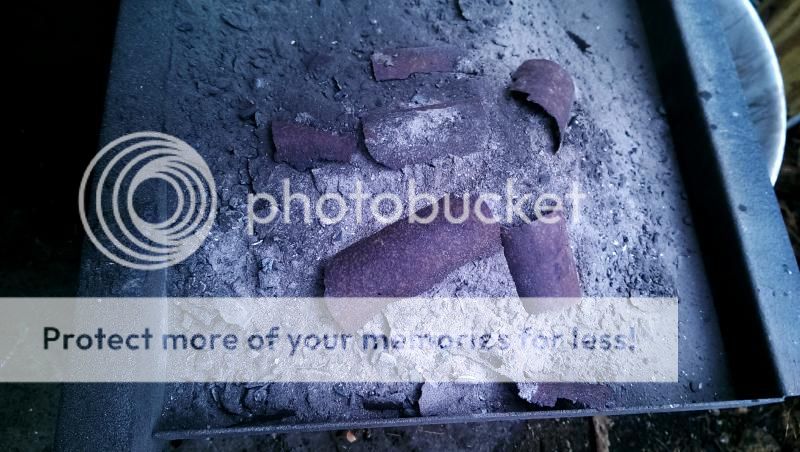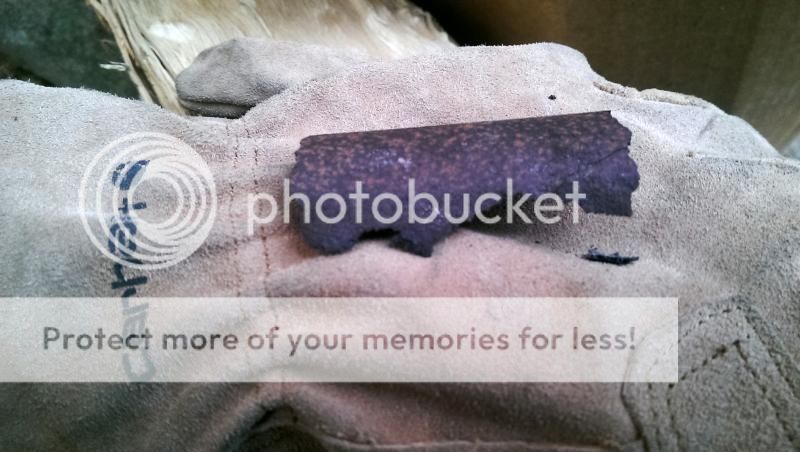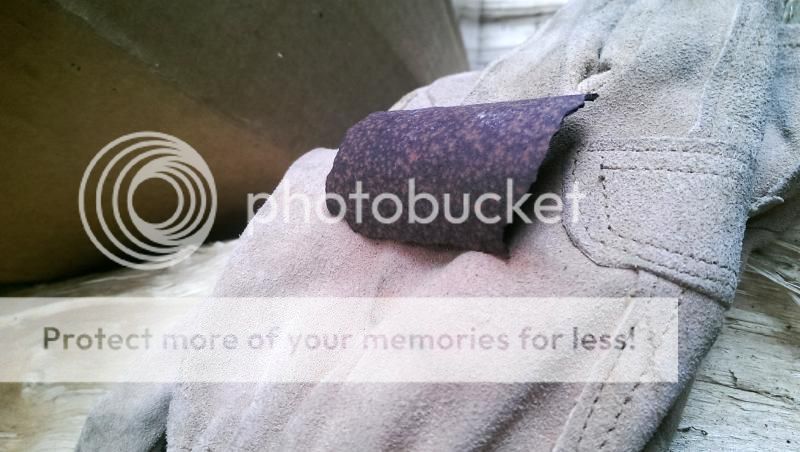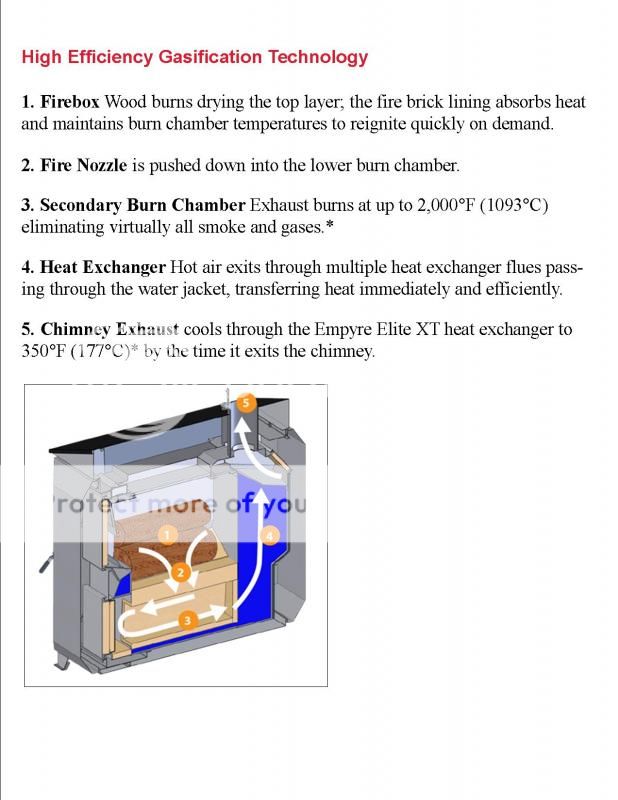I got this out of my flue
- Thread starter Roundgunner
- Start date
-
Active since 1995, Hearth.com is THE place on the internet for free information and advice about wood stoves, pellet stoves and other energy saving equipment.
We strive to provide opinions, articles, discussions and history related to Hearth Products and in a more general sense, energy issues.
We promote the EFFICIENT, RESPONSIBLE, CLEAN and SAFE use of all fuels, whether renewable or fossil.
You are using an out of date browser. It may not display this or other websites correctly.
You should upgrade or use an alternative browser.
You should upgrade or use an alternative browser.
- Status
- Not open for further replies.
maple1
Minister of Fire
Did that come from tubes?
Sure looks like metal scale - which I don't think would be a good thing. Is that what it is?
Sure looks like metal scale - which I don't think would be a good thing. Is that what it is?
BoilerMan
Minister of Fire
Eric Johnson
Mod Emeritus
Looks like metal, but it must be scale. If it were fire tube, the firebox would be full of water. That's assuming the Elite II 200 is a boiler. If it's a furnace, the house would be full of smoke.
Like maple1, I'm confused about the term "flu." That's typically a description of a chimney. But the diameter is way too small for a chimney.
I suppose it's possible that it's part of a firetube that hasn't been completely corroded out. But I doubt it.
Like maple1, I'm confused about the term "flu." That's typically a description of a chimney. But the diameter is way too small for a chimney.
I suppose it's possible that it's part of a firetube that hasn't been completely corroded out. But I doubt it.
brenndatomu
Minister of Fire
That looks just like what I got out of my stove pipe tee this past summer. I had to replace it as I could see pin holes through it. It was only 3 years old. Boiler tube should be a lot thicker than stove pipe, but that's still not good
Woodfarmer1
Member
First you need to find out if it's metal, appears to look like scale from the inside of the tube. I used their rotary tool when I had my elite 100 so the crude coming out of the tubes was not cylindrical shaped like the tube.
woodsmaster
Minister of Fire
huffdawg
Minister of Fire
What's your chimney flue made of? And is there a flue cap?
I've had pieces of insert fall into the clean out before.
I've had pieces of insert fall into the clean out before.
It is slightly magnetic, barely hold itself up with strong magnet.
Yes return water no less than 140.
It is from the flue tubes not chimney.
Chimney has cap.
Yes return water no less than 140.
It is from the flue tubes not chimney.
Chimney has cap.
Fred61
Minister of Fire
If it's slightly magnetic it's iron oxide (rust). Now to figure out why oxidation is occurring in the tubes. It's a high heat area and rust is usually killed by heat. My first thought is bad steel.
maple1
Minister of Fire
How old is the boiler?
I can sort of understand not wanting to open the possibility of incoming criticism or opening cans of worms - but I think I would show this to the dealer & manufacturer & ask them what the heck is going on. I can't imagine what kind of operating conditions/procedures would lead to the tubes making rust like that - short of the fire being out for days at a time at the same time rain water was coming in the top, or something of the like. Do you ever have any condensation showing anywhere near &/or inside the HX?
I can sort of understand not wanting to open the possibility of incoming criticism or opening cans of worms - but I think I would show this to the dealer & manufacturer & ask them what the heck is going on. I can't imagine what kind of operating conditions/procedures would lead to the tubes making rust like that - short of the fire being out for days at a time at the same time rain water was coming in the top, or something of the like. Do you ever have any condensation showing anywhere near &/or inside the HX?
The only time the fire is out is during he summer. The boiler was installed fall of 2013. I guess I will send a photo to manufacturer.
maple1
Minister of Fire
So just into the second season - almost new.
I would find it very hard not to be on to the dealer about this, and the manufacturer. It is definitely not something I would consider 'normal'.
Can you get/dangle a light & small camera down/in there & get some internal pics?
I would find it very hard not to be on to the dealer about this, and the manufacturer. It is definitely not something I would consider 'normal'.
Can you get/dangle a light & small camera down/in there & get some internal pics?
I did just send pix to manufacturer. I will up date. I' an a photographer but no capability get down a tube.
maple1
Minister of Fire
I did just send pix to manufacturer. I will up date. I' an a photographer but no capability get down a tube.
Ya, I wasn't sure about the construction & access on it - was also wondering if there was just a cover on top or bottom you could pop off & take pics from there.
Good luck though.
Manufacturer said it is minor and happens during the summer when the boiler is cooler than air and forms condensation that forms rust. He said best remedy would be to swab out the tubes with a oily rag after spring cleaning. Sounds reasonable. I do use it for heating the pool every couple weeks but I will just have to do it again. I have gallons of hydraulic oil from the tractor.
Fred61
Minister of Fire
I do not wish to be negative on this but I would question the manufacturer's claim. That's a huge cross section of rust to be caused by summer condensation. I would expect a very thin layer from condensation but that thickness would have me concerned. Rust (oxidation) is natures "anodizing" which forms to protect the metal. That thin layer of rust would protect the substrate from continued oxidation by shielding it from the air. It would take several years to produce that thickness of rust under normal conditions with quality steel.
Eric Johnson
Mod Emeritus
I second Fred's concerns, and would only add that it seems odd to me that your boiler does this, but mine, which also has fire tubes and sits idle all summer, doesn't. In addition, based on your photo, the volume of corrosion seems to be limited to one tube, suggesting to me a material or manufacturing defect. If a tube or tubes rot out, I doubt there's any way to repair it.
maple1
Minister of Fire
Think I agree. There are all kinds of boilers on here with tubes that sit idle & 'cold' all summer (not really 'cold', but at room temp), and this is the first thing like this I've read about. I think the only possible way to make that happen, was if really cold water was running through it constantly, and it was sitting in very hot & humid conditions. Otherwise, the boiler temp would equalize with the ambient air temp, more or less - sometimes might be a bit less, sometimes might be a bit more. Even if there were no reports of rust scale per se, there should be some of condensation running/dripping and collecting somewhere, like a secondary chamber - haven't read of that either.
These guys are right....
My boiler is shut down from May to October, like Maple says most in here do, most with no special treatment or rubdowns.. ..Easy boys
..Easy boys !
!
The HX tubes look like :
after brushing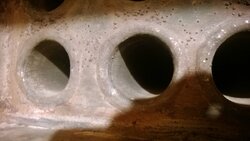
before brushing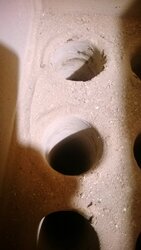
Only fly ash..never anything that resembles rust....
I would call the Manufacturer back...
Good luck
Scott
My boiler is shut down from May to October, like Maple says most in here do, most with no special treatment or rubdowns..
 ..Easy boys
..Easy boys !
!The HX tubes look like :
after brushing

before brushing

Only fly ash..never anything that resembles rust....
I would call the Manufacturer back...
Good luck
Scott
S.Whiplash
Member
- Oct 28, 2012
- 113
From my experience If any wood or pellet boiler is left over summer without cleaning it out thoroughly ash because of it's high acidity can corrode metal when it comes in contact with moisture. Is this an indoor or outdoor boiler?
I can not ascertain for sure, but by looking at the boiler model posted above, the heat exchange tubes, seem to be directly below the collar/flue. Also do not see any info regarding the type of chimney/offsets, etc.
I can not be sure, but it looks like some of these pieces may have pits and tubercles, which is a positive sign for dissolved oxygen based or moisture oxidation. If the flue/chimney is condensing heavily and running down into the HX section, this may be the causality of 2 events, creating the rust.
Of course accumulated ash, left deposited with added moisture would also cause fouling, but I am not sure it will be of this type, or magnitude, especially after such a short operational life span..??not sure on the life of the unit.
Finally, as Fred mentioned above, another factor would be metal fatigue...caused by the aggravation of constant thermal cycling of bad metal ....
Scott
I can not be sure, but it looks like some of these pieces may have pits and tubercles, which is a positive sign for dissolved oxygen based or moisture oxidation. If the flue/chimney is condensing heavily and running down into the HX section, this may be the causality of 2 events, creating the rust.
Of course accumulated ash, left deposited with added moisture would also cause fouling, but I am not sure it will be of this type, or magnitude, especially after such a short operational life span..??not sure on the life of the unit.
Finally, as Fred mentioned above, another factor would be metal fatigue...caused by the aggravation of constant thermal cycling of bad metal ....
Scott
Last edited:
- Status
- Not open for further replies.
Similar threads
- Replies
- 5
- Views
- 931
- Replies
- 4
- Views
- 458
- Replies
- 18
- Views
- 848
- Replies
- 1
- Views
- 298


